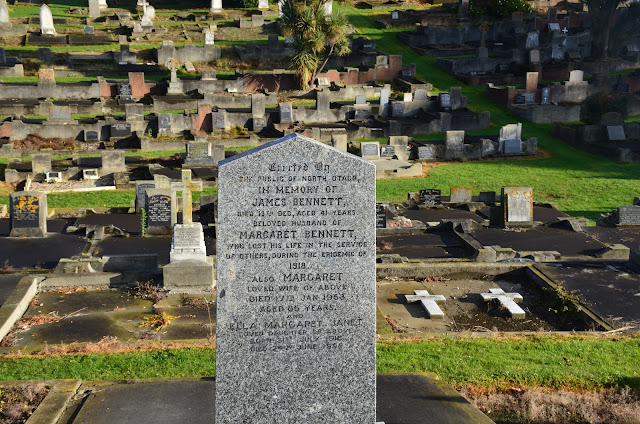OBITUARY.
General regret will be felt among all classes of the community that Mr James Bennett yesterday afternoon, as the direct result of his unselfish and untiring efforts in helping others stricken down by the epidemic, himself died of pneumonia following on influenza. That regret will be keener among chose who really knew him. Beneath a bluff and casual manner lay a kindly heart and a generous disposition, and a receptive and retentive mind; capable of original thought in mechanical and scientific channels. Of an inventive turn, the late Mr Bennett invented a wool-cleaning apparatus which has, we understand, given most favorable results at the Pukeuri works, where since their inception, Mr Bennett has proved of service in the mechanical and' electrical departments. Though self-taught, Mr Bennett's ideas often proved of value to persons with long experience. Born in Oamaru, he always took a keen interest in all out-door sports. As a member of the old Volunteer Company he was well known as an expert rifle shot, and was keenly interested in rifle shooting up till his death, being successful both at the butts and at the miniature ranges. He was one of those who believed that the first aim was the best, and as a snap game shot was in a class of his own. A keen cricketer, he was a useful man at the crease or in the field. The late Mr Bennett was an enthusiastic bandsman. He was a member of the M.U.I.O.O.F. A keen angler, he took a deep interest in all acclimatisation matters, and had closely studied, from American sources and from personal observation, the quinnat salmon question. A good raconteur and a good sportsman in any circumstances, his figure will be greatly missed, amongst those- who wield rod or gun, nor will they be surprised that he met his death in the way he did, for he was one or those of whom none can recall a contemptible unmanly action, or a shirking of his share of any unpleasant duty. His widow and child will have the sympathy of a very wide circle, of friends, by no means restricted to North Otago.
A TRIBUTE.
Mr Walter Sumpter writes as follows: — "I am sure you will not grudge me space to offer a tribute to the memory of my late friend, Jim Bennett. From my own personal knowledge I can testify that there has never been a truer case than his of a man risking and losing his life in giving help to others. During the influenza epidemic the help he gave, in visiting and carrying aid to afflicted patients, was beyond all praise. Disregarding all risk to himself, unobtrusively and energetically he worked from first to last until he contracted the fatal disease himself, and there will be many homes in this district which will long cherish the memory of his cheery words and smiles, which must have done, so much towards helping many patients to recover. Truly, he was one who laid down his life for his friends and his reward will not be wanting." -Oamarau Mail, 13/12/1918.
The remains of the late, Mr James Bennett, or Isis Street, were followed to their last resting place yesterday by a large cortege. Most noticeable were workers in the recent epidemic, to whom, perhaps the worth of the deceased was best known. Members of every sporting interest were represented. Wreaths almost hid the casket, including floral tokens from the North Otago Jockey Club, Oamaru Trotting Club, Waitaki Acclimatisation Society, and the V.A.D. Ven. Archdeacon Russell presided at the graveside. -Oamaru Mail, 14/12/1918.
THE LATE JAMES BENNETT MEMORIAL
NOETH OTAGO FUND OPENED.
Some thirty gentlemen met in the Ambulance Hall yesterday afternoon under the chairmanship of' His Worship the Mayor. All those present, had been active voluntary workers in combating the influenza epidemic and were assembled to make arrangements to give the public of North Otago an opportunity of showing, in a tangible manner, their appreciation of the services of the late Mr James Bennett. Bennett, who died practically in harness in the service of others, was one of the first volunteers, and so keen was he to help that he arranged to take his annual holiday to enable him to devote the whole of his time to service in aiding sufferers from, the disease. Praise has been freely bestowed on the voluntary workers and in many quarters proposals have been made to, in some way, recognise their devotion in the humane cause. The workers themselves, however, do not desire praise or reward but now that a comrade in the work has fallen, they feel that the public will seize the opportunity to show their appreciation by demonstrating in a practical manner sympathy with the bereaved mother and her child.
A sub-Committee consisting of the Mayor, Archdeacon-Russell, and Messers. W. Sumpter, G. H. Deal, L. E. Haines, Alex. Hamilton and C. W. Kent (Hon. Secretary and Treasurer), was appointed to make arrangements for launching the project.
The Committee feels confident that an appeal of this nature in memory of one who literally gave up his life for others, will not be made in vain and. that donations will be given as freely as Mr Bennett gave his services.
We shall have pleasure in receiving and acknowledging contributions, or they may be transmitted to the Hon. treasurer at the Oamaru Borough Council Chambers. -North Otago Times, 17/12/1918.
Oamaru Cemetery.






